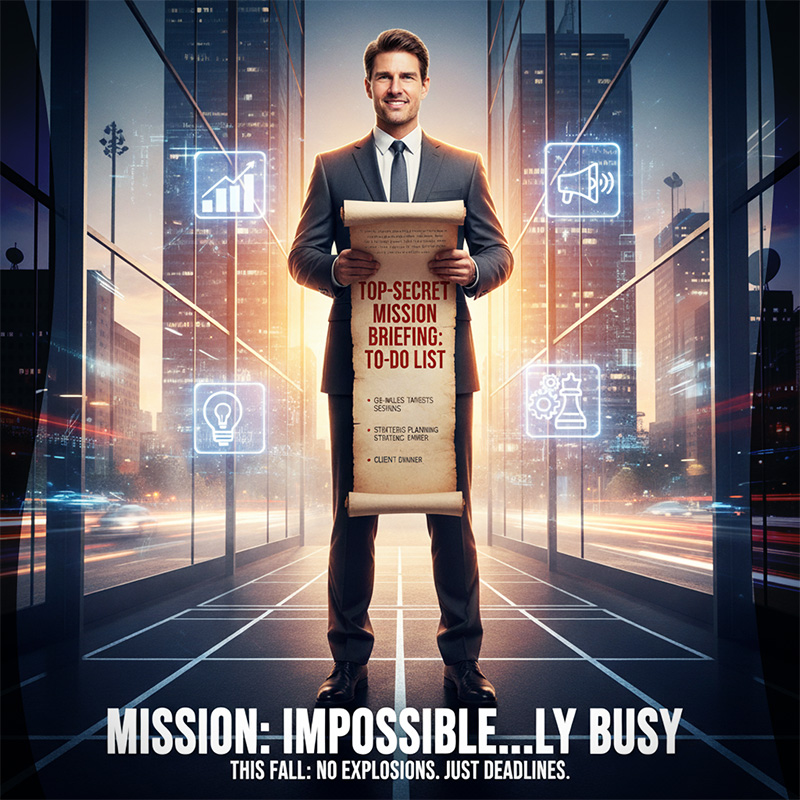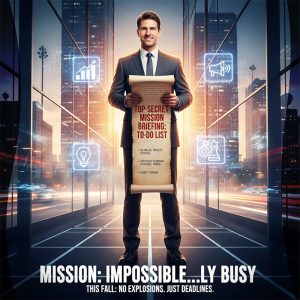
December Business Playbook: Retain Clients & Boost Revenue
Prepare Your Business for Q1 2026 December is not just
By Jean-Charles Spanelis – October 26, 2025

Modern CEOs often resemble secret agents. Always on a mission, never off-duty, constantly juggling sales, strategy, team leadership, and client management.
But unlike James Bond, they don’t have a Q Branch inventing shortcuts — or a scriptwriter ensuring a happy ending. Their only weapon? The to-do list.
And somewhere between theory and practice, that list can quickly turn into a work of fiction.
Every Monday morning starts with good intentions. The CEO opens their calendar, sets priorities, and plans the week ahead. Then reality kicks in.
A strategic client calls, a staff issue explodes, or an unexpected opportunity appears. Suddenly, the tidy to-do list becomes an ever-changing adventure plot written in real time.
But beneath the chaos lies a deeper question: should every leader really do everything themselves?
Because the real danger of wanting to control it all is losing focus on what truly matters — the company’s direction and vision.
“An effective leader doesn’t do everything — they make sure everything gets done.”
Being a CEO means wearing many hats — strategist, coach, salesperson, recruiter, sometimes even firefighter.
If these roles aren’t managed wisely, they start colliding. The hours spent putting out fires often steal from what truly matters: developing business and driving growth.
This is where smart management comes into play. Knowing when to delegate or outsource isn’t a weakness — it’s a strategic advantage.
Learn how to bring structure back to your commercial organization and regain clarity in your priorities by exploring Commercial Outsourcing & Organizational Maturity.
A CEO’s workload isn’t an inevitability — it’s a choice of focus.
Outsourcing key functions like prospecting, sales management, or client follow-up can transform daily pressure into structured progress.
Delegating doesn’t mean stepping back. It means re-centering your energy on high-impact decisions, long-term partnerships, and strategic growth.
Discover how to boost your efficiency and results with a proven outsourcing model on Finelis.com.
One of the most common CEO traps is confusing urgency with importance.
Urgent tasks make us feel productive; important ones shape the future.
It’s the long-term, often “non-urgent” decisions that define the company’s real trajectory.
To regain control, a few simple tools go a long way:
The key isn’t to plan every minute but to create flexible structure — where the to-do list serves you, not the other way around.
A self-aware leader knows how to laugh — even at themselves.
Humor is more than relief; it’s a powerful emotional management tool. It helps teams breathe, bond, and refocus.
Saying, “My to-do list added 12 new tasks before 10 a.m.” might draw laughter, but it also builds empathy and realism.
Because true leadership isn’t about perfection — it’s about keeping your sense of direction and humanity intact.
And sometimes, a well-timed joke does more than a meeting: it restores energy and connection.
Turning a chaotic list into a clear roadmap starts with one principle: every task should serve a goal.
The most effective leaders don’t check more boxes — they check the right ones.
Instead of a never-ending list, why not try a three-horizon vision?
The CEO’s to-do list will never be empty — that’s the price of leadership.
But when approached with strategy, humor, and a willingness to delegate smartly, it becomes a compass, not a constraint.
Maybe the true “mission possible” for today’s leaders is simply this: to focus on what truly matters.

Prepare Your Business for Q1 2026 December is not just

Between strategy, leadership, and delegation, learn how CEOs can transform their overwhelming to-do lists into powerful instruments of business clarity.

Understanding your website visitors means unlocking insights to sharpen your sales strategy, personalize outreach, and drive measurable results.

Lead generation is no longer about quantity but quality. In 2025, success comes from targeting the right prospects and guiding them with trust and care.

There is no absolute winner in the CRM battle. The right CRM is the one that matches your goals, teams and sales maturity.

Leadership can be isolating. Executive coaching provides support, perspective, and tools to help leaders make confident and effective decisions.